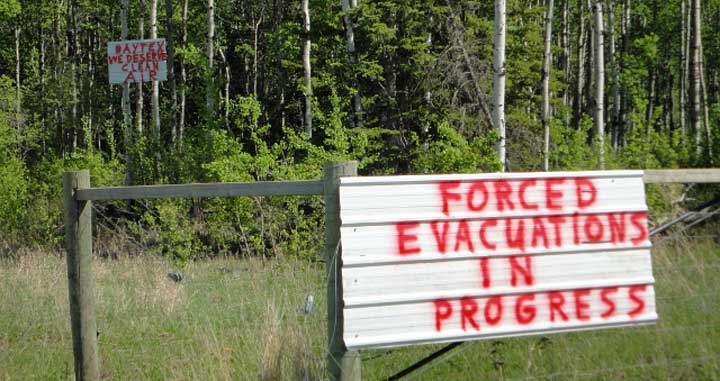It’s been three years since members of the Labrecque family first started to get sick – thanks, they say, to oil fumes from next door. Now they’ll need to wait a little longer for a judge to determine whether the oil tanks near their land will be temporarily shut down.

“It’s definitely been disheartening and discouraging,” said Brian Labrecque, the son of two of the complainants. “In my parents’ situation, it’s been two years. And the other families, longer than that yet.
“Just when you think you’re making a little bit of progress, it’s one of these situations where it’s one step forward, two steps back.”
The Labrecques blame their illness on fumes generated by tanks owned by Baytex Energy, right near their homes in Reno, Alberta, southeast of Peace River. They complained of headaches, dizziness and other medical problems they believe are caused by the tanks’ emissions. Several members of the family left their homes to get away from the fumes. Seven families in total, not all of them Labrecques, have left the area, according to the Labcrecques’ lawyer Keith Wilson.
READ MORE: Ill wind – Alberta families leaving homes for health reasons blame oil giants next door
Michel and Leona Labrecque, Alain and Karla Labrecque, and Andre and Marie Labrecque, all filed an injunction against Baytex in December 2013, asking the courts to order Baytex to shut down 86 vented bitumen storage tanks for eight months, which they say will give the company time to construct “properly sealed bitumen tanks.” None of the parties to the injunction is currently living in the area, though they still own the land.
Baytex, for its part, has said its emissions don’t break any rules and it doesn’t need the additional sealing.
Both sides presented their cases to the Court of Queen’s Bench in Peace River on Wednesday, only to be told the judge needed more time to make a decision. Brian Labrecque expects to hear back in four or five weeks.
“The judge was unable to hand down a decision. He basically said because of the amount of material he had to go through, and it is pretty extensive, of course, he would need to take some time before he could rule on it,” said Labrecque. He thinks there’s a fifty-fifty chance that the injunction will be granted.
He thought there would be more urgency to resolve the situation. “People have to put their lives on hold, and many of them lost their livelihoods … while the operator, the one who has been releasing these emissions into our airshed and causing these problems, hasn’t really missed a beat throughout all of this.”
Andrew Loosley, director of stakeholder relations for Baytex, said the company’s emissions are safe, and the only barrier to sealing storage tanks is the residents themselves.
“It’s important to note that expert advice with scientific study on the air in Reno has repeatedly said that the air is safe and we are committed to taking steps to reduce emissions in all our area operations,” he said in a prepared statement.
“For more than three years we have been trying to install equipment that will upgrade the facilities that we bought in 2011, and capture emissions from the production sites. However, area landowner objections, roadblocks and continued objections to our regulatory applications, some as recently as last week, have prevented us from making the exact improvements that these landowners have been asking for.”
Labrecque said his family has never objected to Baytex installing vapour recovery systems. “Yesterday when their counsel brought it up, we were all kind of looking at each other and thinking, who objected? It’s definitely not us.”
Even if the injunction is granted, he isn’t sure any of the families will return. “When you’ve been out of your home for two years, and your home and property has been abandoned, it’s actually quite a daunting task to return and to try to get everything back in order and get your life back in order.”
The Labrecques and other Peace River-area families also participated in a public hearing by the Alberta Energy Regulator into odours and emissions from oil operations in their area in January. A report, including recommendations for changes to regulations, is expected to be released on March 31.





Comments